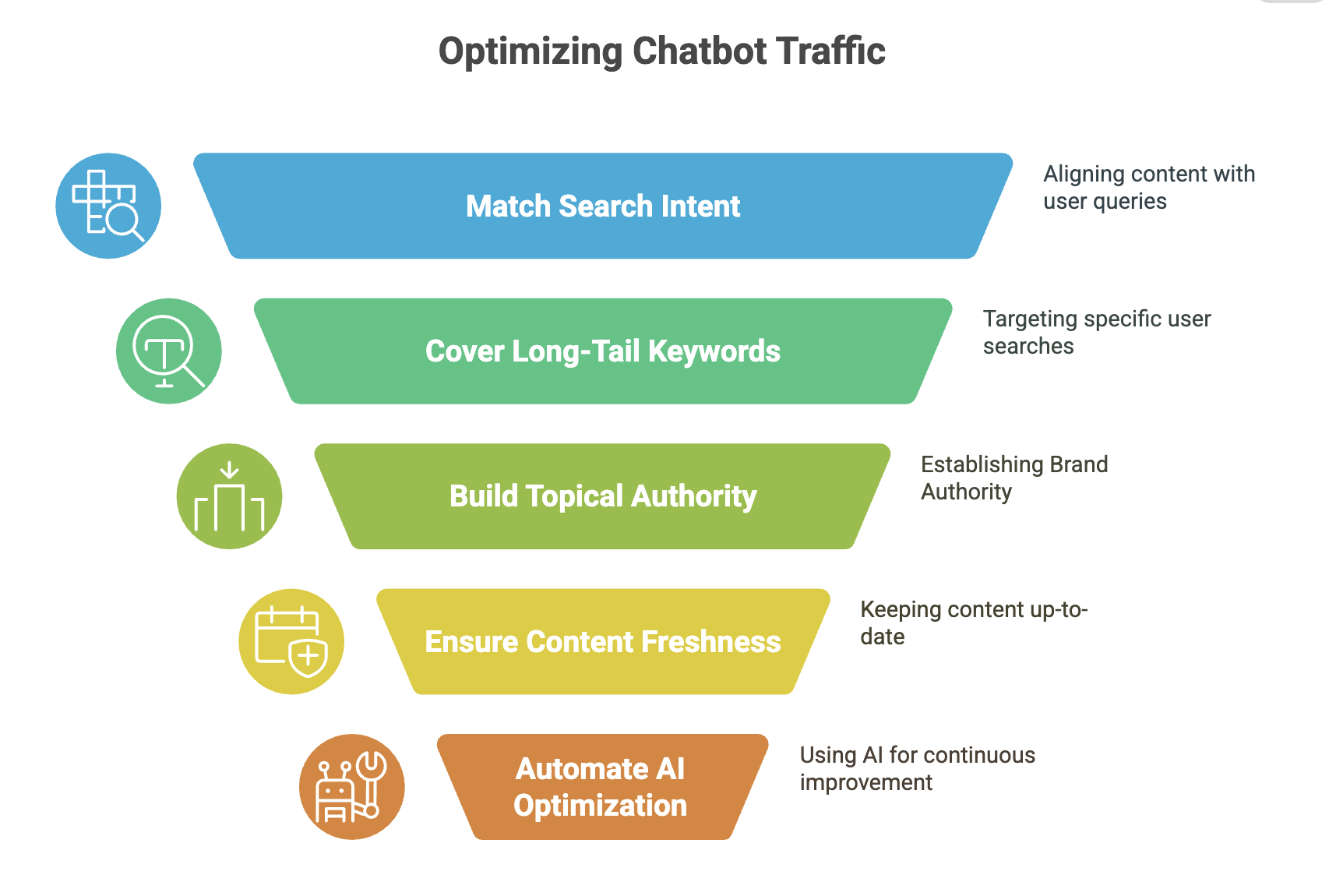What is Generative SEO (GEO)
Generative Engine Optimization (GEO) is a new evolution of search engine optimization that leverages AI, automation, and real-time user intent to create content strategies that scale. Unlike traditional SEO, which relies heavily on manual keyword research, GEO uses machine learning models, intent analysis, and content generation tools to build SEO plans that adapt to how people search today, especially the searches being dominated by conversational AI, AI-generated search results, and dynamic SERPs.
For marketers, GEO is becoming a must to refer generative search and LLM traffic to websites, by aligning content creation with real user questions and evolving search patterns.
We Analyzed 5 Key Factors That Contribute to Chatbot Traffic
- Search Intent Matching: Content must directly address what users are looking for—whether it’s information, comparison, or a solution. GEO thrives on accurately identifying and mapping these intents.
- Long-Tail Keyword Coverage: Generative SEO favors deeper, more specific content that targets long-tail queries, which often have lower competition and higher conversion potential, as in AI overviews.
- Topical Authority: Creating a structured content ecosystem around a theme (e.g., pillar pages + supporting content) helps build trust with both users and search engines.
- Content Freshness and Relevance: GEO strategies regularly monitor new trends and questions, ensuring content is timely, up-to-date, and aligned with recent user behaviors.
- AI Optimization & Automation: GEO automates discovery, planning, and forecasting. This reduces time-to-publish and allows for continuous improvement based on real performance data and feedback loops.
Based on these factors, and the helpful input of several SEO / GEO thought leaders, we created a workflow upon which developed our AI agent, and we like to call it Gen-Y!
What Does Gen-Y Do
We developed an AI-powered SEO agent that combines real user questions, AI search trends, and keyword data to build adaptive, intent-driven content strategies.
At its core, the Generative‑SEO AI agent is an automated “research assistant” that:
- Discovers what audiences are asking online.
- Combines those insights with hard data (volumes, difficulty).
- Monitors AI Overview keywords.
- Matches intent and plans content calendars.
- Monitors competitors and brand mentions.
How Our AI Agent Works
Mining Common Questions from AI Models
The agent prompts AI services like ChatGPT and Claude to list and scrape the top questions users ask about your industry. It also taps Perplexity to cross‑check and enrich that list, ensuring you capture varied phrasing and niches.
Listening to Industry Forums, Competitors Post and Brand Mentions
Next, it scrapes forums like Reddit and Hacker News for real‑world discussions about your topic, so you see the exact language people use and any fresh trends.
Merging with Traditional SEO Data
All those questions get matched against keyword‑research sources, AI overview keywords, and users Google Search Console API.
Building a Unified Keyword List and a Content Calendar
Based on volume, intent, and publishing capacity, the agent lays out a month‑by‑month editorial plan, assigning topics and article types.
Traffic Forecasting and Suggest Content Velocity
While this is still under experimentation, but we should mention that these are purely estimations and there are several variables that impact traffic.
Using a simple growth formula
Tn=T0×(1+g)n
Where
- 𝑇𝑛 = traffic in month n
- 𝑇 0= traffic in month 0 (your starting traffic)
- g = monthly growth rate (data from GSC)
- n = number of months into the future
The agent projects your future organic traffic under the new plan, and finally, it suggests how many articles and backlinks you’ll need each month to achieve the forecasted targets, based on industry benchmarks and difficulty levels.
Tech Stack and APIs used
| Component | Technology/API | Why It Matters |
| AI Question Mining | OpenAI ChatGPT, Anthropic Claude | Quick, natural‑language insights on user intent |
| Forum Scraping | Not Disclosed | Captures real‑world discussions and emerging trends |
| Keyword Research | Not Disclosed | Accurate volumes, competition, and long‑tail suggestions |
| Search Console Integration | Google Search Console API | Leverages your own site’s actual search queries |
| Workflow Orchestration | Apache Airflow | Automates, schedules and monitors each step |
| Reporting & Visualization | Custom Dashboard | Shareable, client‑friendly performance dashboards |
Benefits for Marketers
- Automates hours of manual keyword research into minutes.
- Audience Alignment: Mines actual questions from AI and forums, so content speaks to your customers.
- Data‑Driven Confidence: Combines intent insights with hard metrics, you know why you’re choosing each topic.
- Competitive Intelligence: Real‑time watch on competitor moves helps you stay one step ahead Sprout Social.
- Scalable Planning.
Why to Use Gen-Y and How it Differs from Other Tools
What truly sets this AI agent apart from standalone tools like Ahrefs or SEMrush is its end-to-end, intent-driven automation and real-time adaptability.
Traditional platforms excel at surface-level metrics, search volume, keyword difficulty, but they still rely on you to interpret that data, spot emerging questions, and manually build your content calendar.
In contrast, our agent continuously mines conversational AI models and industry forums to uncover the exact language and pain points your audience is using right now. It then enriches those insights with hard SEO numbers and auto-generates a prioritized, intent-based content roadmap, complete with traffic forecasts and technical recommendations.
This means you’re not just getting static keyword lists; you’re receiving a dynamic, data-backed strategy that evolves as your market conversations evolve, giving you a proactive edge.
Deploying this AI agent is like giving your marketing team a 24/7 SEO analyst, one that never sleeps, always learns, and turbocharges your content strategy.
